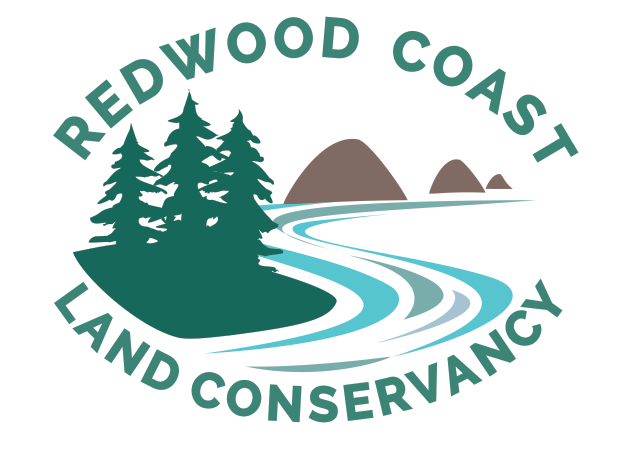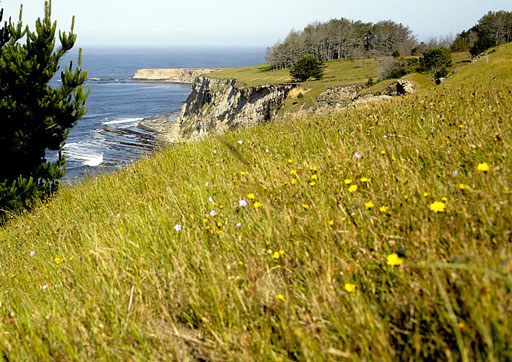Cypress Abbey coastal prairie and the Pacific
Photo courtesy of Bureau of Land Management
San Francisco Chronicle
July 23, 2013
by Peter Fimrite
The spectacular bluffs around Point Arena, where one can gaze upon sea lions frolicking and whales spouting in the frothing sea, will be preserved forever as open space, a national land conservation group said this week.
A $5.3 million deal, which is expected to close by Friday, will open to the public a 409-acre wildflower- and forest-covered coastal plain along the Mendocino County coast, where a nuclear power plant was once slated to go. The purchase, orchestrated by the Trust for Public Land, completes a two-pronged effort to protect from development more than a mile of privately owned coastline within view of the Point Arena Lighthouse, a remote outpost near Gualala and 129 miles north of San Francisco.
“It’s remarkable that this unique, beautiful stretch of the California coast now belongs to all of us,” said Sam Hodder, the California director of the trust, which put together a partnership of individuals, foundations, and state and federal agencies to buy the land from the Cypress Abbey Co. “This is one of those places that reminds you of why we all love California.” …
To read the entire article, visit the San Francisco Chronicle: Glorious North Coast site saved as public land
Conservation Easement Incentive Act:
A message from Congressman Mike Thompson
July 23, 2013
Dear Friend,
Today I joined my Republican colleague from Pennsylvania, Jim Gerlach, in announcing that we will introduce the bipartisan Conservation Easement Incentive Act of 2013. The legislation provides a permanent tax incentive to family farmers, ranchers, and other landowners who chose not develop their land and instead preserve their property for conservation.
By providing tax benefits to landowners who choose conservation, the bill helps preserve our nation’s farm lands and open spaces for future generations. The bill has received broad bipartisan support in the House of Representatives, with more than 125 original co-sponsors.
Conservation easements work. They’ve already encouraged landowners to conserve millions of acres of farm lands and scenic open spaces, but there’s more we can do. By making this important conservation tool permanent, our bill will give landowners the certainty they need to preserve and protect even more land and natural resources for future generations.
Under our legislation, landowners who donate their property’s development rights would maintain ownership and management of the land, but forgo their rights to develop the land in the future.
The Conservation Easement Incentive Act would make permanent an enhanced tax incentive for donating development rights that will otherwise expire at the end of 2013. The incentive’s current uncertainty discourages conservation because it takes an average of three years to set up a conservation easement. Landowners who want to donate their development rights for conservation may not know if incentive’s tax benefits will be available to them by the time their conservation easement is established. Eliminating this ever-changing deadline will give more farmers, ranchers, and forest owners the assurance they need to choose land conservation over development.
In addition, the Conservation Easement Incentive Act would also help moderate-income landowners choose conservation by:
- Raising the maximum deduction a donor can take for donating a conservation easement from 30 percent of their adjusted gross income (AGI) in any year to 50 percent;
- Allowing qualified farmers and ranchers to deduct up to 100 percent of their AGI; and
- Increasing the number of years over which a donor can take this deduction from 5 to 15 years.
The Conservation Easement Incentive Act has been endorsed by the Land Trust Alliance, Ducks Unlimited, National Wildlife Federation, National Cattleman’s Beef Association, American Forest Foundation, Congressional Sportsmen’s Foundation, and more than fifty other groups.
As we move forward with tax reform, conservation easements need to be part of the equation. Tax reform is about the future of our country and our tax policies should help protect our national treasures and open spaces.
The bill will be referred to the House Committee on Ways and Means for further consideration, on which I serve. I will continue working to make sure this bill is passed.
Sincerely,
Mike Thompson
Member of Congress

